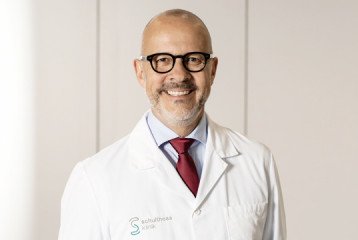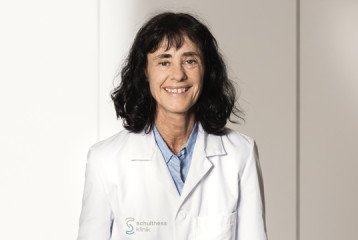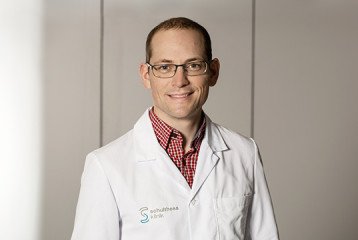Anaesthesiology
Annual Report 2022
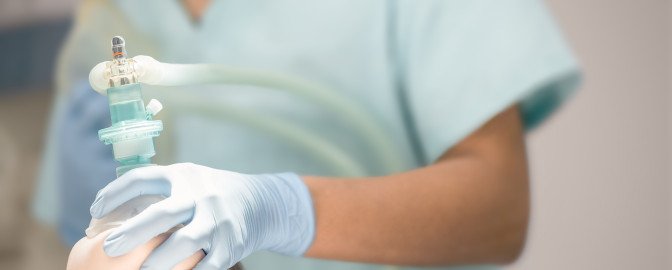
The Anaesthesiology team accompanies patients before, during and after the operation. This ensures the safety and well-being of the patients remain the top priority. In the highly specialised area of surgery, we are only able to provide the services our patients need thanks to active teamwork and the solid training of our specialists.
This thorough training and the broad expertise of our team underpin the safe and high-quality care we provide to our patients. The collective wealth of experience includes not only anaesthesia in the narrower sense, but also intensive care medicine, emergency medicine, perioperative medicine and pain therapy as well as process management, research activities and professional training. This allows us to build on a strong foundation and keep up a constant pace of growth. We evaluate and improve work and procedures in the operating theatre on an ongoing basis in order to continuously raise the quality of anaesthesia.
Last year, as in the previous year, we again worked with a great deal of commitment alongside the anaesthesia nursing team to perform more anaesthesia procedures (+ 3.7%, 359) and to expand our consultation activities. Of the total 7,994 anaesthesia consultations, 2307 were carried out within the context of telemedicine. We also introduced postoperative pain rounds. All this cannot be taken for granted in light of the increasing staff shortages; all those involved therefore deserve a very big pat on the back – thank you.
In addition to these clinical activities, we made progress on many projects that further improve the quality of perioperative treatment for our patients and ensure patient safety.
Modern anaesthesia workstations with fully electronic documentation
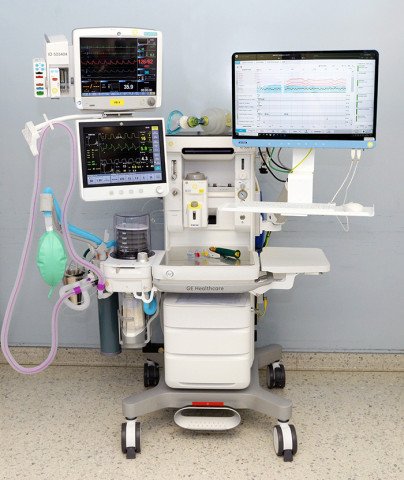
Last year, we again invested heavily in the continued modernisation of our standardised anaesthesia workstations in the form of modern respirators. Since 1 January 2023, these have been equipped with a patient data management system (PDMS) after an extremely short project planning period carried out by an interprofessional team led by Dr. med. David Schurter.
Using digitalisation, all anaesthesiological care during an operation is accurately recorded and stored in the medical documentation. In addition, the data is delivered to the A-QUA programme of the Swiss Society of Anaesthesiology and Perioperative Medicine (SSAPM), which monitors the quality of anaesthesia in Switzerland. This ultimately leads to a reduction in the workload for anaesthesia nurses and anaesthesia doctors so that they can focus on patient care, which in turn helps to improve quality assurance.
Focus on pain management
Standards of perioperative pain management
Our anaesthesia pain specialists, Dr. med. Yusmely Salazar and Dr. med. Stephan Steinhauser, dedicated themselves to standardising perioperative pain management at Schulthess Klinik. Together with the orthopaedic departments, they have developed standards and therapy plans that start as early as during the operation itself.
The feedback from the departments has been consistently positive: “The newly established pain service is a valuable addition to the clear directives and easily understood instructions that aid everyday care. The pain service always deals professionally and helpfully with any concerns about pain, whether raised by the patient or a nurse,” reports Angela Limacher, Head of Nursing Development. In addition, a pain telephone has been established, which is operated daily by the pain specialists.
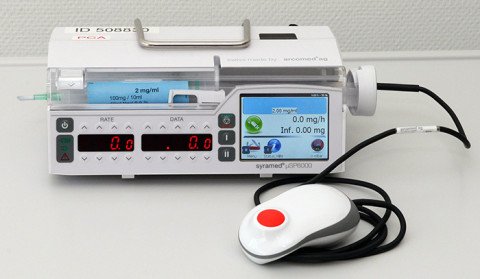
Modern, patient-controlled analgesia
Newly introduced modern microprocessor-controlled PCA (patient-controlled analgesia) pumps allow patients to individually and independently control the administration of analgesics within predefined safety limits. This form of pain therapy is mainly used for very painful procedures and expands the range of treatment within pain management. Our experience in this area from last year shows that patients are very satisfied with this. There were also significantly fewer side effects from pain medication.
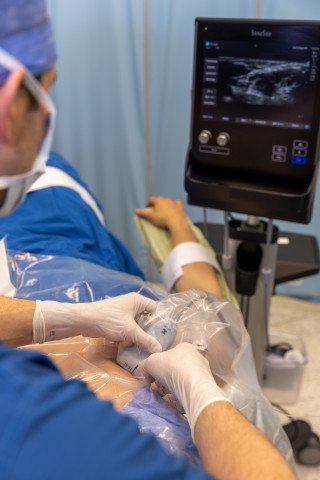
Standards in ultrasound-guided regional anaesthesia
Ultrasound-guided regional anaesthesia has found a firm footing in shoulder surgery this year as part of a multimodal type of perioperative pain therapy. Standards that precisely define the use of this technique were developed across multiple disciplines and seamlessly introduced by the anaesthesia specialists under the direction of Dr. med. Kerstin Löhr together with surgeons specialising in shoulder orthopaedics. The feedback from our patients shows that this has also improved pain management after shoulder surgery and increased patient comfort.
New quality label in anaesthesiology
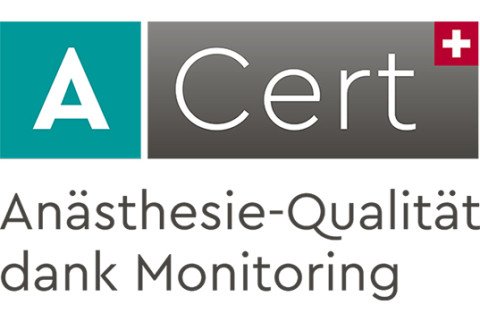
A-CERT is a newly developed quality label in anaesthesiology in Switzerland. The first trial certification in Switzerland was successfully carried out on 14 March 2022 in the Anaesthesiology department at Schulthess Klinik. The doctor responsible for this, Dr. med. Christine von Szadkowski, was also instrumental in developing the criteria catalogue for the label.
The new quality label is awarded by the Swiss Society for Anaesthesiology and Perioperative Medicine (SSAPM) and the Foundation for Patient Safety in Anaesthesia (SPSA). The auditing institution is the Swiss Association for Quality and Management Systems (SQS). After a total of seven trial certifications in 2022, the programme will now officially start in 2023 with voluntary certifications of anaesthesiology departments across Switzerland. The label is a way of systematically assessing quality in anaesthesiology departments in order to maintain and continue to promote patient safety in a rapidly changing healthcare system.
Partnerships
In the field of intensive care medicine, we were able to establish a cooperation between the anaesthesiology departments of Schulthess Klinik and the Balgrist Orthopaedic University Hospital. As part of this, a working group with doctors from both hospitals (from our side Dr. med. Daniel Hurschler) has not only developed a transport concept, but also a cross-institution treatment concept. This allows our patients to be transferred to the neighbouring intensive care unit through a connecting tunnel following major operations, should they require intensive care.
In order to provide optimal care for even our youngest patients, we strive to cooperate with specialised hospitals in the canton of Zurich. We have also formed a cross-cantonal medical training partnership and our paediatric anaesthetists, Dr. med. Madeleine Niederer and Dr. med. Mital Dave, are developing differentiated, standardised care pathways for children of different age groups.
Commitment to continued education and training
The quality of medical treatment can only be maintained and increased if staff are well trained. This is why promoting the next generation of doctors has been a major focus of Schulthess Klinik for decades. We are happy to pass on our knowledge, as this also allows us to secure qualified professionals for our team in the long term, ensuring our continued development through further education and training.
Training for junior doctors
Since 2022, we have been a certified anaesthesia training centre for the Swiss Institute for Postgraduate Education and Continuing Professional Development (SIWF), which involves training junior doctors. A clearly structured training concept was developed by Dr. med. Mirjam Kissling-Rauch under which junior doctors with different levels of experience and training can be supervised. While the practical training is carried out by the anaesthesiology team in our department, the theoretical training required by the FMH is delivered in cooperation with the anaesthesiology departments of Balgrist University Hospital and Klinik Hirslanden.
We supervise our first three junior doctors individually, supporting them according to their needs and encouraging them on their career path. This means, after only nine months, we were able to promote our first junior doctor, Dr. med. Sylwia Dahl, to deputy senior physician.

Advanced anaesthesia training on the Lengg, Zurich’s Harley Street
The anaesthesiology departments of Balgrist University Hospital, Klinik Hirslanden and Schulthess Klinik are now offering joint further training courses. Specialists from our own ranks and invited experts pass on their knowledge in courses and practical workshops. 2022 saw the first series of "Zurich Ultrasound Days" (basic and advanced course). In 2023, training will be expanded further, for example with a course on airway management, the mastery of which is fundamental in ensuring patient safety.
Research project on major spinal procedures
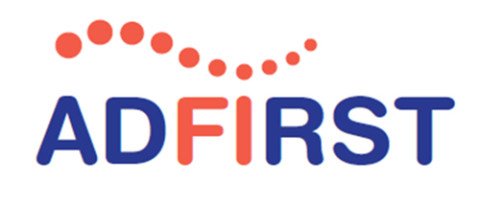
As a Swiss reference centre, we are involved in an international multi-centre study, the “AdFirst” study (Adjusted Fibrinogen Replacement Strategy Study), together with PD Dr. med. Markus Loibl from the spine team. This study will test whether an artificially produced coagulation factor, fibrinogen, is as suitable as fresh frozen plasma, which is produced from donor blood, for optimising blood clotting and preventing bleeding during major spine surgery. Fibrinogen has already been used successfully in everyday clinical practice for several years.
